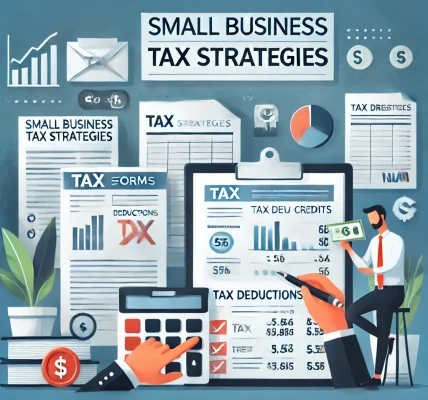Entrepreneurs are the backbone of a thriving economy, constantly driving innovation, creating jobs, and making impactful business decisions. However, as an entrepreneur, one of the most crucial aspects of your financial strategy is tax planning. Effective tax planning not only helps you maximize profits but also ensures that you are legally minimizing your tax liability while fostering business growth.
In this blog, we will delve into key strategies that entrepreneurs can implement to balance business growth and tax efficiency, all while remaining compliant with tax laws.
1. Why Tax Planning is Crucial for Entrepreneurs
Unlike salaried individuals, entrepreneurs have several avenues for managing their taxes, including various deductions, exemptions, and rebates. But with great freedom comes great responsibility. Without a sound tax plan, businesses can end up paying more taxes than necessary or face penalties for non-compliance. Tax planning is not just about minimizing your tax burden; it’s about setting a solid foundation for your business to grow and thrive.
Effective tax planning allows entrepreneurs to:
- Reduce tax liability: By taking advantage of tax-saving opportunities.
- Manage cash flow efficiently: Minimize surprises by planning for taxes throughout the year.
- Reinvest profits: Allocate savings from tax efficiency back into business growth.
2. Key Tax Planning Strategies for Entrepreneurs
a) Choose the Right Business Structure
The structure of your business has a significant impact on your tax liability. Common structures include:
- Sole Proprietorship: A simpler structure, but the owner is personally liable for the business’s debts.
- Partnerships: Offers tax flexibility and shared responsibility.
- Limited Liability Company (LLC): Provides liability protection and tax flexibility.
- Corporation: Higher tax rates, but potential for deductions and lower self-employment taxes.
The right structure depends on various factors like your revenue, risk, and long-term goals. For example, LLCs and corporations offer more tax planning opportunities such as deductions for health benefits, retirement plans, and business expenses.
b) Take Advantage of Business Deductions
As an entrepreneur, you can claim deductions on a wide range of business-related expenses. Some common deductions include:
- Office Rent and Utilities: Rent paid for your office or workspace can be deducted.
- Employee Salaries and Benefits: Salaries, health benefits, and employee retirement contributions are deductible.
- Business Travel and Meals: Travel expenses and meals related to business activities qualify for deductions.
- Depreciation on Assets: Equipment, machinery, and even vehicles used for business can be depreciated over time, resulting in tax savings.
By thoroughly reviewing your business expenses, you can identify potential tax-saving opportunities. Tracking receipts and maintaining detailed financial records is essential for making the most of these deductions.
c) Make Contributions to Retirement Plans
For entrepreneurs, contributing to retirement plans is not only an investment in the future but also a great way to save on taxes. Retirement plans such as PPF, NPS, and 401(k) (in the US) provide tax deductions.
- PPF (Public Provident Fund): Contributions to PPF qualify for tax deductions under Section 80C in India.
- NPS (National Pension Scheme): Additional tax benefits are available for contributions to NPS under Section 80CCD.
- Retirement Accounts in the US: Contributing to SEP IRAs or Solo 401(k)s can reduce your taxable income.
For entrepreneurs, contributing to these retirement plans can lead to long-term tax benefits, as you can defer tax payments on these contributions until retirement.
d) Implement Income Splitting
Income splitting is a strategy that involves spreading your income among various family members or business partners to take advantage of lower tax brackets. For example:
- Family Members: If your family members are in lower tax brackets, you can pay them a salary for their involvement in the business and thus reduce the overall tax burden.
- Spousal Income Splitting: If your spouse is involved in the business, paying them a reasonable salary can help reduce taxes.
However, it’s important to ensure that the payments are reasonable and justifiable to avoid any issues with the tax authorities.
e) Invest in Tax-Advantaged Accounts
In addition to retirement accounts, certain investments offer tax advantages. Some of these include:
- Tax-Free Bonds: These investments provide tax-free interest income, which can be beneficial for high-income earners.
- Municipal Bonds: If you are in a higher tax bracket, investing in municipal bonds can help reduce your taxable income.
By incorporating tax-advantaged investments into your portfolio, you can minimize the impact of taxes on your investment income, leading to higher returns.
f) Consider Timing of Income and Expenses
The timing of your income and expenses can affect your tax liability. For example:
- Deferring Income: If possible, defer income to the following tax year, especially if you anticipate being in a lower tax bracket in the coming year.
- Accelerating Expenses: If you know that you will incur expenses, consider accelerating them into the current year to maximize deductions for the current tax year.
By managing the timing of income and expenses, you can shift income to years where you have lower taxable income, thus reducing your overall tax liability.
g) Keep Track of Business Losses
If your business incurs losses in a particular year, you can use those losses to offset income from other years. This is known as tax loss harvesting.
- Carry Forward Losses: If you don’t have enough taxable income in the current year to offset the losses, you may be able to carry them forward to future years.
- Carry Back Losses: Some jurisdictions allow you to carry back losses to previous years, which can result in a tax refund.
Using business losses strategically can provide immediate financial relief and reduce your tax burden.
3. Consult a Tax Professional
Tax laws are complex and constantly changing. It’s crucial for entrepreneurs to stay informed about the latest tax regulations and strategies. Partnering with a tax advisor or accountant who specializes in small business taxation can help you navigate the nuances of tax planning and ensure that you are maximizing your tax efficiency.
A professional can assist with:
- Identifying eligible deductions.
- Optimizing tax strategies specific to your business.
- Filing accurate returns to avoid penalties.
4. Balancing Growth and Tax Efficiency
While tax planning is crucial, entrepreneurs must always keep an eye on the long-term vision of their business. Balancing tax efficiency with business growth means that you must reinvest profits into areas that contribute to your business’s success, like marketing, expanding operations, or improving your products/services. It’s about optimizing tax savings while also ensuring that your business continues to scale and innovate.
Conclusion
For entrepreneurs, tax planning is a critical component of running a successful business. By choosing the right business structure, claiming the right deductions, investing in retirement plans, and implementing smart strategies like income splitting and loss harvesting, you can minimize your tax liability while simultaneously fostering growth.




